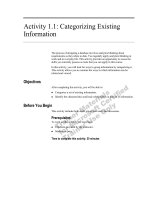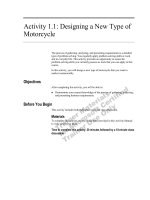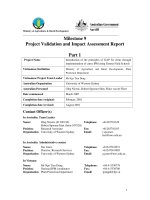Report activity 1 ibc201 ib17b02 group 1
Bạn đang xem bản rút gọn của tài liệu. Xem và tải ngay bản đầy đủ của tài liệu tại đây (50.43 KB, 6 trang )
Cross Cultural Management and Negotiation
IBC201: Cross Cultural Management and Negotiation
REPORT ACTIVITY 1
Introduction:
In this report, we focus on two main parts. The first one is Framing, which refers to the way in
which a negotiator presents information and shapes the context of the negotiation in order to
influence the other party's perceptions and decisions. The second one is twelve errors or
cognitive biases that tend to impede negotiator performance.
Body:
I/ Framing in Negotiation
II/ Cognitive Biases in Negotiation
1. Irrational escalation of commitment
Group 1 – IB17B02
1
Cross Cultural Management and Negotiation
-
Even though sticking to a course of action is irrational, negotiators maintain their commitment
to it.
Individual's proclivity to make decisions that lead to the continuation of a failed course of action.
For example, consider someone who is gambling and decides to bet everything they have on
one more hand in a card game. This type of move can mean the difference between making a
fortune and losing everything.
2. Mythical fixed-pie beliefs
-
All negotiations, not just some, are thought to involve a fixed pie by negotiators.
The tendency to view negotiation as a zero-sum or win-lose situation in which the interests of
the parties are diametrically opposed.
For example, imagine that two friends are haggling over who will get the largest portion of a
gourmet pizza. As much pizza as possible is desired by each side. That is where they stand. The
mythical and actual fixed pie is the pizza.
3. Anchoring and adjustment
-
The impact of the reference point (anchor) used to compare subsequent adjustments (gains or
losses)
The anchor may be deceptive because it is based on inaccurate or incomplete information.
Being unduly swayed by a standard or reference point (an anchor) and
Failing to make adjustments from it.
EX: When a seller sells a used phone, the first price they offer must be higher than the price they
want to sell, and the two parties begin negotiating to offer a reasonable price for both parties
purchase and sale agreement.
4. Issue framing and risk
- In decision making and negotiation, frames can lead people to seek, avoid, or be neutral about
risk.
- The proclivity to be unduly influenced by the positive or negative frame in which risks are
perceived.
EX: An example of issue framing and risk can be seen in the debate over vaccination. Some
people may frame the issue as one of public health and the need to protect individuals and
communities from the risks associated with infectious diseases
5. Availability of information
Group 1 – IB17B02
2
Cross Cultural Management and Negotiation
-
-
People tend to be focused, and attracted to information that is concisely described and
presented vividly.
Ex: In the negotiation between the owner of a coffee shop and an investor, the owner of the
cafe needs to present information about the plan to develop the cafe and the benefits that the
investor can recover in a short time tight, logically. Doing so can make it easier for investors to
keep track of what the owner says, as well as remember them. You can use tools to enhance the
vibrancy such as PowerPoint, and mind map,...
The available information can become an important center in the evaluation of facts and
choices.
Ex: In the negotiation between a coffee shop owner and an investor, assuming the coffee shop is
in a state of loss, there is no possibility of recovery, the investor has the right to think and
evaluate the profitability. and decide whether to invest or not.
6. The winner’s curse
-
-
A winner's curse is a situation in which an auction winner suffers damage from overestimating
the value of an item and overpaying for it. The winner's curse is often used in auctions. Due to
the lack of information about the products and materials being auctioned, participants
overestimated the value of the product.
Negotiators who were dissatisfied after having their first offer accepted reported that they
would be less likely to make the first offer in future negotiations (Galinsky, Seiden, Kim, and
Medvec, 2002).
Ex: In the antique auction, there was an antique vase with a value of $ 1M, but the auctioneer
had no knowledge of this antique vase, just because he was so interested, he made the initial
bid. The first is $4M. And as a result, he won the first time. And when he learns the true value of
the vase, he finds it difficult because of his stupid decision.
7. Overconfidence
Negotiators tend to believe that their opinion or judgment is more accurate than its actual accuracy is
called overconfidence. And overconfidence has two effects:
-
-
Negotiators will always advocate views or options that are not really right. It means that for
people who do not have an overconfident attitude, they will have a normal, fact-based opinion
to make an assessment. As for overconfident negotiators, they tend to have absolute confidence
in their point of view, even if it's not true.
Negotiators with an overconfident attitude tend to ignore, dismiss, or reduce confidence in the
other person's point of view.
For example, In the discussion about the research and development of new products of
company A, the employees said that it is necessary to research and launch new products to
meet the needs and attract consumers. Their old product has been around for more than 20
Group 1 – IB17B02
3
Cross Cultural Management and Negotiation
years and there has never been a single innovation. In the present time, there are many new
competitive companies appearing, with more trending quality and designs. However, the
director did not agree to the new product launch because he thought that the company's
products were still meeting the needs of customers. He still believes that the product is still
good and still profitable. If the director still has an overconfident attitude in his product and
ignores the input of employees, there is a risk that Company A will be overtaken by competitors
8. The law of small numbers
-
The law of small numbers is a cognitive bias that occurs when people assume that small samples
will be representative of the larger population from which they are drawn.
Example is when a company assumes that the feedback from a small group of customers will be
indicative of the opinions of all their customers. This assumption may not be accurate if the
small group of customers happens to have different characteristics or preferences from the
larger population. To avoid this bias, it is important to collect and analyze data from a
sufficiently large and diverse sample size to draw more accurate conclusions.
9. Self-serving biases
-
Self-serving bias is a cognition bias in which individuals often interpret another person's
behavior by making attributions. It is to both the person and the situation. To the person, it
means the behaviors were caused by internal factors such as ability, mood, or effort, etc. And to
the situation, the behaviors were caused by external factors such as the task, fate, other people
have actions that affect, etc. There is a tendency known as fundamental attribution error, it
overestimates the role of personal or internal factors and underestimates the role of situational
or external factors.
Example: Consider the athlete who fails in a competition. Perhaps he is lazy (he doesn't try to
practice to achieve the best result possible), or perhaps he is allergic to the weather of this day,
to the food that the organizing committee prepares, and he can not show his best performance.
According to the Self-serving biases, the most reason for the failure of the athlete is himself, he
does not try to practice, and he is lazy.
10. Endowment Effect
-
The endowment effect is a cognitive bias that describes the tendency of people to value an
object or item more highly once they own it, simply because they possess it. In other words,
people tend to place a higher value on something they own, even if it has no inherent value or
the same value as before they owned it. Even when its true value is recognized, the sheer act of
Group 1 – IB17B02
4
Cross Cultural Management and Negotiation
holding something tends to lead individuals to enhance its perceived value.
Example: Imagine that you own a vintage guitar that you have been wanting to sell for some
time. You ask your friends about the price they would like to buy it. They just want to pay about
$300 and you are not satisfied with that price, so you keep it for yourself. One day, a friend asks
to borrow the guitar for a performance, and you agree. After they possess it, they feel very
interested in its special sound and they willing to pay for $400, a higher price.
11. Ignoring Others’ Cognitions
-
Ignoring others' cognitions refers to a cognitive bias where individuals tend to disregard or
discount the thoughts, beliefs, and opinions of others. Ignoring others' cognitions can lead to
misunderstandings, lack of empathy, and missed opportunities for collaboration and
compromise; they will work with incomplete information, and thus produces faulty results
For example, a manager in a company is responsible for leading a team of employees. One of
the employees, Sarah, approaches the manager to discuss a project they're working on
together. Sarah shares some concerns about the project and suggests some changes that she
thinks would improve its outcome. The manager, however, is not interested in hearing Sarah's
perspective. They dismiss her concerns and ideas without really listening to her, and instead,
they impose their own ideas on the project. The manager believes that their way is the only way
to complete the project successfully. In this situation, the manager ignores Sahara's cognition.
As a result, Sarah feels undervalued and disrespected. She may become less motivated to work
on the project, and her trust in the manager may decrease. The project itself may also suffer as a
result of the manager's unwillingness to consider alternative perspectives and ideas.
12. Reactive Devaluation
-
Reactive devaluation is a cognitive bias where people devalue proposals or offers made by
someone who they perceive as an adversary, simply because the proposals or offers are made
by that person, and not because of the merits of the proposal or offer itself. Essentially, it is the
tendency to reject an idea or proposal simply because of the source it came from, rather than its
own inherent worth.
Example: If an employee who is disliked by their colleagues suggests a solution or idea, the other
employees may be more likely to reject it simply because it came from that particular employee,
rather than evaluating the idea on its own merits.
Group 1 – IB17B02
5
Cross Cultural Management and Negotiation
Group 1 – IB17B02
6









